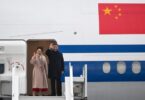Therese Raphael
In some ways, China’s decision to impose ret-aliatory sanctions on Britain, along with the US, European Union a-nd Canada has been clarifying. A group of vocal U.K. Conservatives have long called for Britain to rethink its China policy. That process was already underway, but in the government’s new strategic review published this month you could feel the hesitation, too.
Global Britain, it said, wouldn’t flinch from speaking out on human rights while also engaging enthusiastically with China on areas of mutual interest from trade to climate change. On paper, it makes perfect sense. This isn’t the Cold War. China is on track to become the world’s largest economy and is an essential partner for the COP26 climate summit in Glasgow later this year.
But the tit-for-tat sanctions of the past week show just how difficult that vision will be to put into practice. China opted for a scattergun response to the coordinated action of the US, the EU, Canada and Britain imposing sanctions on four officials involved in the mass internment of Uyghur Muslims in Xinjiang.
It’s clarifying because in sanctioning senior British lawmakers, institutions and a scholar, China has united politicians across Britain’s political spectrum. It has also had a unifying effect among allies. If Donald Trump’s “America first” posture allowed China to pursue a Bismarckian divide-and-conquer strategy, Beijing’s recent actions show those days are over.
Western unity is more important than ever as there’s likely to be a period of increased uncertainty. What are China’s red lines now? The new rules of engagement are unclear.
One clue came Wednesday with China’s surprise decision not to show up to a meeting on climate change. Of course, this may be posturing. At the recent meeting in Alaska between US and Chinese officials, the public comments were accusatory while a more business-like environment proceeded once the cameras were off.
Certainly some of the theatre is intended for an increasingly nationalistic Chinese domestic audience. Beijing has often used its media to spark a “patriotic” reaction. It was only after the March 22 announcement of sanctions against Chinese officials in Xinjiang that criticism over the supply chains of a number of global fashion brands blew up, with calls in Chinese media for a boycott of H&M, Nike, Burberry and other brands. It’s unclear whether the damage to hugely popular companies like Nike will be permanent. In the past, that hasn’t been the case.
“The British will want to stick to the overall approach they set out in their Integrated Review and won’t want to be blown off course,” Peter Ricketts, a former U.K. National Security Advisor and ambassador to France, tells me. “The alternative is bad news economically, commercially and in terms of the climate conference. But a lot will depend on how far the Chinese want to take it. It’s a question of whether they call it a day on this round and move on.”
The heat of this moment may indeed pass. “To a certain extent, it’s absolutely a symbolic move by China,” says Veerle Nouwens, a research fellow at the Royal United Services Institute. What’s notable over the past year is how China hasn’t hit out at the U.K. in the way it has against other countries such as Australia, she notes.
There are reasons for that restraint. With the world’s sixth-largest economy, a seat at the United Nations Security Council and deep financial-market infrastructure, Britain remains an appealing partner even if the “golden era” of Beijing-London relations promised by David Cameron in 2015 hasn’t materialized. China sees major partnerships — including its building of Britain’s first new nuclear power plant in decades — as a showcase. It’s aware of Britain’s cultural currency and the value of educational ties: Chinese students make up the largest foreign cohort studying in the U.K.
Beijing has also hoped to encourage post-Brexit Brit-ain to think selfishly. In a recent policy paper for the Council on Geostrategy, C-hina expert and former dip-lomat Charles Parton says Beijing “recognizes Brita-in’s close ties with the US, but seeks to dilute them.”
None of that will prevent a rough ride ahead. The U.K. is about to send its new aircraft carrier, the HMS Queen Elizabeth, on her maiden deployment to the South China Sea, a move that will probably prompt comment about imperial ambitions and references to the Opium Wars. The new U.K. National Security and Investment Bill will impact Chinese participation in scientific research. And after a year of pandemic, Western public opinion is alive to the subject. “Consumers today are a lot more aware and a lot more interested in issues around modern slavery, sustainability and privacy. And it’s not just about Xinjiang,” says Nouwens. Tensions over Tibet, Taiwan and China’s stifling of Hong Kong also figure.
Purely punitive diplomacy against a superpower would be a mug’s game for Britain, but we’re a long way from a new set of rules. China’s decision to cynically repurpose the West’s recent Magnitsky-style sanctions (designed to hold human rights abusers to account) for its own goals is telling. Targeted sanctions can minimize the diplomatic cost. By distinguishing between the individual and the regime — a fiction in China’s case — they allow room for negotiation later. If talk turns to sanctions against industries, as with US measures against Russia, you’ll know things have escalated significantly.
While Ricketts sees the government trying to rest-ore balance, policy nuances will shift more toward hard-nosed action. Whether that will draw a more proportionate response from Beijing than this round is hard to say. But now the Chinese have discovered they can play the sanctions game too, we’re likely to see much more of it.
Bloomberg






